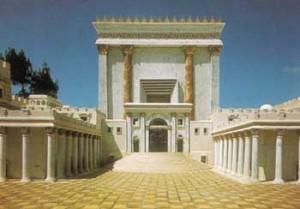J.P. Nunez
From the Mar/Apr 2012 Issue of Lay Witness Magazine

In the Gospel of John, Jesus is presented as the new Temple. At the beginning of the Gospel, John explicitly calls Jesus’ body a temple (Jn. 2:19-21), and he continues this theme throughout the book. While he never explains what this means for Christians after Jesus’ Ascension, it easily lends itself to a Eucharistic interpretation. As Jesus’ physical presence on earth, the Eucharist should be our new Temple.
Throughout the rest of the Gospel, John shows Jesus fulfilling the feasts that were celebrated in the Temple. For example, Jesus proclaims at the Feast of Tabernacles that He is the light of the world (Jn. 8:12, 7:2). During this feast, the Temple was lit by giant candelabras whose light spread throughout the whole city of Jerusalem. Thus, Jesus is saying that He, not the building in Jerusalem, is the true Temple that lights up Jerusalem and the whole world.
During the Feast of Dedication, Jesus says that the Father has consecrated Him to go out into the world (Jn. 10:36, 10:22). This feast celebrated the consecration of the second Temple, the one built after the first was destroyed by the Babylonians. Again, Jesus is ascribing to Himself an aspect of the Temple that was celebrated at this feast. He is the true consecrated Temple of God.
For Jesus to continue as our Temple after His Ascension into heaven, He must still be with us in a physical manner; a merely spiritual presence will not do. And since the new Temple is Jesus’ physical body, only the Eucharist can fit that description here on earth after His Ascension.
In order to appreciate the significance of all this, we must understand the role that the Temple played in ancient Israel. Only if we know what the first Temple meant to God’s people in the Old Covenant can we know what the new Temple should mean to us in the New Covenant.
The Israelite Temple was God’s visible dwelling place on earth. The writers of the Old Testament often expressed this by saying that God’s name or His glory dwelt within it (Ps. 74:7, 1 Kings 8:10-11). For them, to enter the Temple was to enter into the presence of God, and it gave them a tangible, visible place to go if they wanted to be with Him in a deeper way (Ps. 63:1-2).
Additionally, the Israelites would offer their sacrifice to God at the Temple (2 Chron. 29:20-21, 30:15). It was the center of their religious lives, the location where the worship God desired was given to Him according to the Law of Moses.
Finally, the Temple was also a place of pilgrimage. The worship prescribed by God’s Law was so important that He commanded all Israelite men to travel to the Temple three times a year, for the feasts of Passover, Weeks, and Tabernacles (Deut. 16:1-17). Since these feasts could only be properly celebrated in the Temple, God wanted His people there to worship Him.
In the New Covenant, the Eucharist should be to us what the Temple was for ancient Israel. For instance, since it is the dwelling place of God among us, we should attend Eucharistic adoration or receive Communion when we want to be with Him in a deeper way. At the end of time, God’s people will no longer need a Temple because He Himself will dwell with us (Rev. 21:22). But we have not yet reached that stage. God does not yet dwell with us in His fullness, so we still need a Temple. We need the Eucharist to bring us into the fullest possible communion with Him here on earth.
Because of this, the Eucharist should be our place of pilgrimage and the center of our religious lives. Many Catholics desire to travel to far away places like Fatima, Jerusalem, and Assisi to visit the spots where the Virgin Mary appeared, the sites where Jesus lived and preached, and the places where great saints lived. But we often forget that the greatest place of pilgrimage, our Temple, is much closer than these famous shrines.
Unlike the ancient Israelites, we do not have to undertake long, arduous journeys to our Temple. For most of us, the Eucharist is only a short drive away. We should take advantage of this great blessing and make the Eucharist our privileged place of worship and pilgrimage.
Put simply, the Eucharist—our New Temple—should be the cornerstone of our prayer lives. No matter how often we celebrate this great sacrament or how mundane its appearance may be, we can never take it for granted or let it become commonplace. We must always keep in mind that the Eucharist is the greatest gift God has given His people.
J.P. Nunez is a graduate student in theology and philosophy at Franciscan University of Steubenville, where he also received his bachelor’s degree in both fields. He currently works at the St. Paul Center for Biblical Theology.

